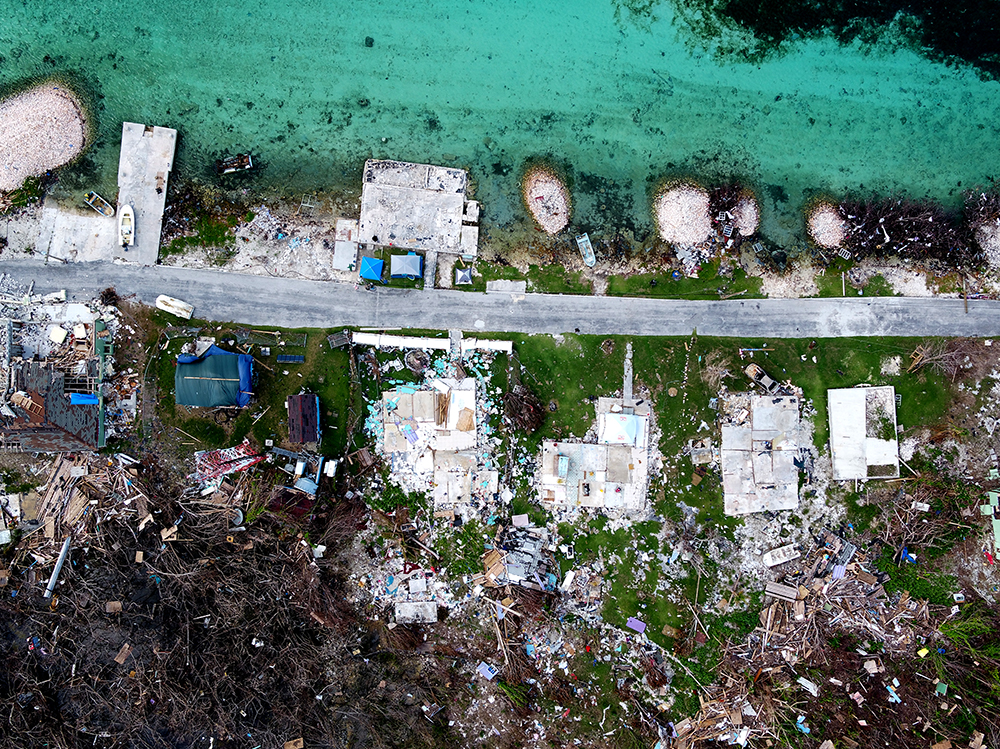|
When Hurricane Dorian struck the Bahamas in September 2019, the devastation it wrought was formidable. Recovering from the catastrophe required understanding its extent—and identifying those areas that were hardest hit. That’s where Josh Gaus and the UMD UAS Test Site came in.
Gaus, an A. James Clark School of Engineering alumnus who currently works as an engineer at the Test Site, traveled to the Bahamas in October to assist the international disaster relief organization GlobalMedic in mapping the damage on Grand Bahama Island, as part of its RescUAV program. The island took a particularly hard hit from Dorian—the hurricane stalled there for an entire day.
Multirotor drones flown by Gaus took high-resolution photos that could then be combined into a single image, providing the kind of overview—both comprehensive and precise in its detail—that local authorities needed in order to allocate resources to the areas in direst need. Pix4dreact software used by the team provided at-a-swipe comparisons between the drone photography and satellite imagery taken prior to Dorian.
“You could see sections of road that had been washed out into the ocean,” Gaus recalls. “You could see the concrete pads where houses had been. A sobering sight—but useful information for the relief effort.”
The mission bore testament to the potential of unmanned aircraft to aid humanitarian endeavors worldwide. But tapping that potential isn’t always a simple matter, says UMD UAS Test Site Director Matt Scassero. “You can’t just show up in another country, say you’re there to help, and start flying drones in the local airspace,” he explains. “It’s far more complicated than that. If you don’t do your homework, you won’t be able to fly and you may even find yourself barred from the country.”
 Governments, understandably, worry about security risks and encroachments on sovereignty. Local officials, including civil aviation authorities, want to know who is flying what, where, and why. Local law enforcement must be kept in the loop. Local or national regulations must be considered, along with any pertinent international covenants. Besides the bureaucratic, regulatory, and legal hurdles, there are cultural and societal impacts to consider: will the people affected see the effort as helpful, or will they regard it with suspicion? Governments, understandably, worry about security risks and encroachments on sovereignty. Local officials, including civil aviation authorities, want to know who is flying what, where, and why. Local law enforcement must be kept in the loop. Local or national regulations must be considered, along with any pertinent international covenants. Besides the bureaucratic, regulatory, and legal hurdles, there are cultural and societal impacts to consider: will the people affected see the effort as helpful, or will they regard it with suspicion?
Navigating these concerns requires organizations to have a clear sense of what they are hoping to achieve, says Rahul Singh, executive director of GlobalMedic. After all, it’s hard to convince others about an endeavor if those involved with it are unclear about its purpose and scope.
“You need a framework and a concept of operations to every mission,” Singh said. “You need to plan to overcome regulatory obstacles, ensure you are licensed, have insurance, and have the right gear, the right pilots, and the right support team. You have to register your drones with the local authority, secure permission to fly, determine whom your client is and what your mission is. There will be logistical challenges to overcome, such as problems with access, inadequate communications, or lack of fuel. Everything requires careful preparation.”
“Having a clear game plan, a good concept of operations, understanding what you are flying for and what you hope to deliver are all important,” Singh said.
The Bahamas mission was a success: with the help of the drones flown by Gaus, GlobalMedic was able to obtain critical data without the high cost of a manned aircraft or the intense time and labor involved in manual surveying. But these results could not have been achieved—indeed, the mission might not have gotten off the ground at all—if the team hadn’t done its homework.
The need for due diligence reflects a more fundamental issue, according to Scassero.
“Ultimately it’s about trust,” he said. “People have to believe that you’re going to respect them, their culture, their national borders and government institutions, and their laws. Being responsive to those you are trying to help, understanding their concerns, and adhering to operational best practices are crucial to building and maintaining that trust.”
March 5, 2020
|

